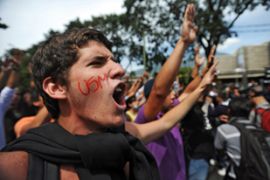Venezuela channel closure denounced
Student dies as thousands take to streets to condemn closure of station critical of Chavez.

Tareck El Aissami, the Venezuelan interior minister, said late on Monday that Josino Jose Carrillo, a 15-year-old pro-Chavez high school student, was killed while participating in a demonstration in Merida.
“Unfortunately several minutes ago a group of students that were protesting peacefully were attacked in a cowardly fashion, and this lamentable incident resulted in the assassination of a 15-year-old youth,” El Aissami said in televised comments.
He said nine police officers from the state of Merida were wounded in the student demonstrations, two of them with firearms.
In other cities, some students were injured in clashes with the police and arrests were made, local media reported.
Curbs on TV station
On Sunday, cable networks stopped carrying RCTV Internacional after the government said the station was not following broadcast regulations that mandate airing Chavez’s speeches.
Venezuela’s cable industry organisation said that RCTV, along with several other stations, “had been temporarily excluded from the programming schedule” because they “had not complied with the regulations in place”.
 |
| Critics say Chavez wants to limit free speech and boost pro-government networks [AFP] |
Diosdado Cabello, the public works minister, said on Saturday that cable networks’ programming could only include stations that obeyed the Venezuelan broadcast law, which also includes restrictions on adult content and foul language at certain hours.
“We are here because of the violation of freedom of expression,” Yanuan Pedraza, a 17-year-old medical student. “This is the second time they have closed RCTV.”
Chavez in 2007 denied RCTV a renewal of its broadcast licence, accusing the station of participating in a 2002 coup against him.
During that coup, networks showed footage of anti-Chavez protests leading up to his brief removal, but turned cameras off when he was restored to power.
Media freedom groups and the US government, which have previously accused Chavez of seeking to limit free speech, condemned the decision to take RCTV off free-access TV.
‘Voice of protest’
RCTV said in a statement earlier this week: “[The measure] is meant to silence the voice of protest of the Venezuelan people in the face of the failure of the government’s administration.”
Miguel Angel Rodriguez, the channel’s most popular talk show host, said: “They want to silence RCTV’s voice. But they won’t be able to because RCTV is embedded in the hearts of all Venezuelans.”
RCTV started a cable-based “international” station based in Miami to avoid content restrictions after having its licence revoked.
But the government said the station was still subject to broadcast restrictions because most of its content was produced in Venezuela.
Chavez faces growing criticism over shortages of power and water and a sharp currency devaluation this month that could accelerate the country’s soaring inflation.
He has boosted pro-government broadcasting in recent years by creating several state-funded television networks including the Telesur channel.